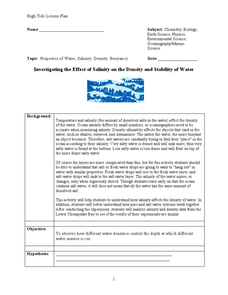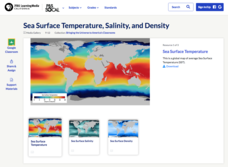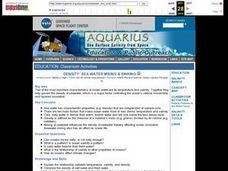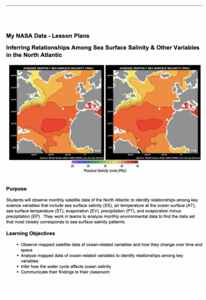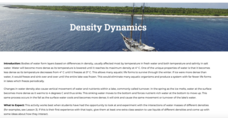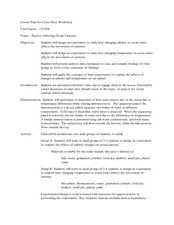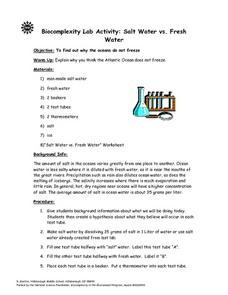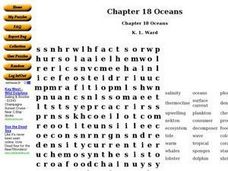NOAA
Oceans of Energy
Are the earth's oceans really just giant batteries, waiting for their energy to be harnessed? Middle school mechanical engineers will be shocked by the amazing amount of energy that forms around them after diving into part four of a...
Curated OER
Investigating the Effect of Salinity on the Density and Stability of Water
Water with varying amounts of dissolved salt are dyed and then used to compare densities. The objective is to discover the effect of salinity, and therefore density, on ocean water on the stability of the ocean. Many branches of science...
PBS
Sea Surface Temperature, Salinity, and Density
Earth's vast ocean is full of mysteries! Science scholars discover the big-picture properties that influence its characteristics at different latitudes using a lesson plan from PBS's Weather and Climate series. After completing a...
Scholastic
Study Jams! Earth's Oceans
Enjoy beautiful images and ocean facts together with the slide show, then see how much you absorbed by taking the quiz. Some of the topics covered in the presentation include water pressure, sunlight in the ocean, the names and locations...
Curated OER
Sea Water Mixing and Sinking
Middle schoolers investigate the role of temperature and salinity in determining seawater density. They use a Temperature-Salinity Diagram to examine the effects of mixing on density.
NASA
Inferring Relationships Among Sea Surface Salinity & Other Variables in the North Atlantic
Some say a picture is worth a thousand words—even from a hundred miles away! Learners review satellite data to analyze ocean variables such as temperature, salinity, evaporation, and precipitation. They look for patterns in the data and...
Polar Trec
Sea Ice Impact
The arctic seas contain currents that are both warm (with high salinity) and cold (relatively fresh water) that circulate throughout the year. Through discussion, a lab, and a web quest, participants explore the impacts of melting and...
Curated OER
Density Dynamics
Students set up working models demonstrating lake turnover and the formation of deep water masses in the oceans.
Curated OER
Salinity
Students take a provided ocean Trivia Quiz in order to start a discussion of the ocean. They then perform an experiment on how the amount of salt in the ocean affects it and varies from ocean to ocean.
Curated OER
Ocean Circulation
In this physical oceanography PowerPoint, viewers learn about ocean circulation, sea surface temperatures, and salinity. Relationships among these aspects are explained, as well as their impact on the atmosphere and climate. Each slide...
Curated OER
One World Ocean
Young scholars compare and contrast the properties of salt water in the oceans/seas and freshwater elsewhere on the planet. They also analyze mixing caused by currents in the ocean, including the effects of warm and cold water as well as...
Curated OER
Is the Hudson River Too Salty to Drink?
Students explore reasons for varied salinity in bodies of water. For this geographical inquiry lesson, students use a variety of visual and written information including maps, data tables, and graphs, to form a hypothesis as to why the...
NOAA
Please Pass the Salt
Salinity is the focus of two experimenters that work to answer the question, How does salt change the physical properties of water? Super scientists compare the freezing rate of salt and fresh water, combine the two waters to...
NOAA
Ocean Layers I
How is it possible for ocean water to have layers? The sixth installment of a 23-part NOAA Enrichment in Marine sciences and Oceanography (NEMO) program investigates factors that cause different water densities to occur. Experiments...
Curated OER
What Lives in the Open Ocean and Where Do They Live?
Students explore oceanography by participating in a flash card activity. In this ocean inhabitant lesson, students define a list of ocean related vocabulary terms and answer ocean geography study questions. Students utilize organism...
Curated OER
Ocean Water
In this ocean water worksheet, students use 6 given terms related to ocean water, early Earth and ocean components to complete the sentences. They also answer 4 questions about seawater, the effects of volcanoes on oceans and ocean life.
Curated OER
Factors Affecting Ocean Currents
Students design and conduct an experiment to determine the effect of salinity and temperature changes in the movement of ocean currents. In this earth science lesson, students record observations and collect data. They share their...
Curated OER
Salt Water vs. Fresh Water
Middle schoolers explore why the oceans do not freeze. They explain why they think the Atlantic Ocean does not freeze. Students are given background information about what they are doing. They create a hypothesis about what they...
Curated OER
Properties of the Ocean: Change
Students research and create a visual presentation on the seasonal salinity of the Earth's oceans. They apply the research in a simulation of a lab disaster in which they must relabel ocean samples.
Curated OER
Conductivity - Pass the Buoy and Pepper, Please
Buoys around our coastlines are equipped with sensory devices which monitor temperature, salinity, and water pressure. Emerging earth scientists examine some of this data and relate salinity to the electrical conductivity of the surface...
American Museum of Natural History
What is Marine Biology?
A marine environment covers the majority of the earth but is arguably the least understood. Teach young scientists about the characteristics of oceans and ocean species using an interactive online lesson. The in-person or remote learning...
NOAA
Ocean Layers II
Now that you know the ocean has layers, let's name them. The seventh installment of a 23-part NOAA Enrichment in Marine sciences and Oceanography (NEMO) program covers terminology associated with ocean layers, such as thermocline and...
Curated OER
Chapter 18 Oceans
For this earth science worksheet, students identify and locate various vocabulary terms pertaining to the ocean and living things found in the ocean. There are 27 ocean terms located in the word search.
Curated OER
A Funny Taste
Learners participate in a demonstration that illustrates the relative amounts of salt in various bodies of water including the Dead Sea, Sallt Lake, Ocean water and distilled water. They taste and compare various mixtures.



